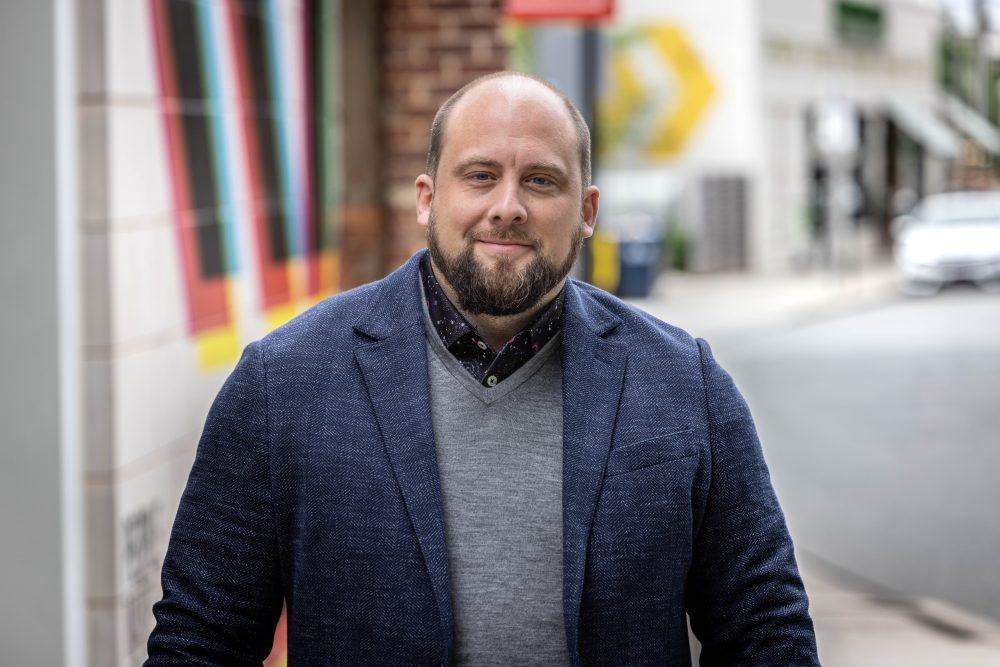Will Linville, AICP CNU-A

Program Manager of the Charlotte Urban Design Center
Education: BS in Geography (Urban Planning concentration), UNC Charlotte (2008)
Master of Urban Design, UNC Charlotte (2021)
Hometown: Yadkinville, NC
Will Linville is a practicing urban designer and planner, having worked both in the public and private sectors in communities throughout North Carolina. Will graduated with his Master of Urban Design in August 2021. In May of 2024, he was promoted to Program Manager of the Charlotte Urban Design Center, where he manages a team of six designers that focus on advancing the quality of Charlotte’s built environment through design projects, public space design and construction, policy and implementation work, vision plans, and community-led placemaking.
With this new position comes many responsibilities, including ensuring that his team is using their expertise as urban designers to provide unique value and technical proficiency to support the residents of Charlotte and and multiple city departments. This is done through a program that focuses on three distinct but equally important service areas – placemaking, studio, and consultancy.
“Our placemaking work is highlighted by our Placemaking Grant – now in its fifth year – that awards neighborhoods funds to implement projects that positively impact sense of place and culture and identity,” Will says. “Staff also works closely with the Corridors of Opportunity team where we regularly implement art, placemaking, and public space projects across the city’s six corridors.”
The Urban Design Center’s studio work is where they use their unique office environment to promote their mission and highlight the importance of quality design by holding monthly events, such as film screenings or panel discussions, that bring together advocates, neighbors, and practitioners. Consultancy work is where they act as in-house consultants for departments across the city.
Before becoming program manager, Will held many different positions as a planner and designer. He has created maps for Board of Adjustment hearings, worked as a transportation planner at an MPO, handled rezonings and subdivision reviews, and completed small area plans for communities in the North Carolina Sandhills area and comprehensive plans for towns in Western North Carolina.
When asked how his Master of Urban Design degree prepared him for his career, Will said, “There is no way that I am where I am at this very moment without my urban design degree. It helps you make sense of the best a city has to offer and how to replicate that in a contemporary environment. I realized 10 years into my planning career that my passion was design. In my opinion, there is immense value in being able to speak a design language. Planners are already gifted at thinking spatially. A design degree helps you build on those gifts and better communicate with clients and stakeholders. My MUD degree and the skills I gained through the program have opened doors that I never thought were possible. I’ll be forever thankful to those in the program that shared their expertise with me!”
Unfortunately, Will and his class couldn’t participate in the travel aspect of the MUD program because of COVID. However, his graduating class was still able to develop lasting relationships and bonds through an otherwise abnormal learning experience, which looking back was a highlight of his time at UNC Charlotte. Will said, “There was real talent in our graduating class, and I can’t wait to see how they grow as subject matter experts and leaders in their fields.”
Will also shared his two wishes for the city of Charlotte. The first – that we hold onto the history that remains. As Charlotte grows and the city’s arc begins to develop further, his wish is that developers and property owners will see value in the existing built environment – particularly as it relates to buildings that contribute to the fabrics of their respective neighborhoods and the local businesses that occupy them. Figuring out ways to encourage not only the adaptive reuse of these structures but also the provision of affordable rent inside of them is a small way in which we can ensure that Charlotte continues to be as authentic as possible.
The second wish – build as much housing as possible. “We need to be hyper-focused on the provision of affordable/attainable housing options around transit stops and activity centers across the city to ensure that Charlotte remains as inclusive as possible.”